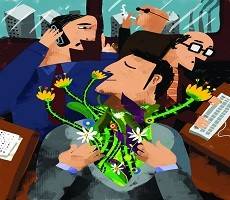September 13, 2016
Sensory response to workplace environment influences performance 0
 Improving employees’ physical and emotional response to their working environment – from the look and feel of a workplace to non-visual sensory inputs such as smell, noise and temperature – can significantly improve productivity and cognitive performance, a new report suggests. According to Decoding the workplace experience: how the working environment shapes views, behaviours and performance, experience is not just about how well the workplace satisfies functional needs, it is about the overall impression it leaves on the user and the way an employee experiences an environment is emotional and occurs potentially at a subconscious level. Sensory influences such as the smell, noise and temperature of the working environment are among the main factors that influence employees’ experiences of the workplace and impact thier performance. Expectations of the workplace also change depending on personality, background and numerous other factors; which is why understanding your workforce is the key to creating an effective workplace experience.
Improving employees’ physical and emotional response to their working environment – from the look and feel of a workplace to non-visual sensory inputs such as smell, noise and temperature – can significantly improve productivity and cognitive performance, a new report suggests. According to Decoding the workplace experience: how the working environment shapes views, behaviours and performance, experience is not just about how well the workplace satisfies functional needs, it is about the overall impression it leaves on the user and the way an employee experiences an environment is emotional and occurs potentially at a subconscious level. Sensory influences such as the smell, noise and temperature of the working environment are among the main factors that influence employees’ experiences of the workplace and impact thier performance. Expectations of the workplace also change depending on personality, background and numerous other factors; which is why understanding your workforce is the key to creating an effective workplace experience.








 A series of reports published in the past few days highlight the challenges faced by Britain’s disabled workers. The studies claim separately that disabled workers are keen to work but are less likely to be in employment and may be hiding disabilities from employers, are paid less when they are in work and that many employers do not feel they are well equipped to deal with the needs of disabled staff. The first study from Reed in Partnership and Disability Rights UK found that one in ten employers do not feel able to support a disabled employee. Meanwhile research from the Equality and Human Rights Commission (EHRC) found that employees who experience mental ill-health earn up to 42 per cent less than colleagues. A third report from Citizen’s Advice found that 40 percent of disabled people would like to work but can’t find a job. And finally a report from RIDI claims that many people applying for jobs may be hiding their disability from employers.
A series of reports published in the past few days highlight the challenges faced by Britain’s disabled workers. The studies claim separately that disabled workers are keen to work but are less likely to be in employment and may be hiding disabilities from employers, are paid less when they are in work and that many employers do not feel they are well equipped to deal with the needs of disabled staff. The first study from Reed in Partnership and Disability Rights UK found that one in ten employers do not feel able to support a disabled employee. Meanwhile research from the Equality and Human Rights Commission (EHRC) found that employees who experience mental ill-health earn up to 42 per cent less than colleagues. A third report from Citizen’s Advice found that 40 percent of disabled people would like to work but can’t find a job. And finally a report from RIDI claims that many people applying for jobs may be hiding their disability from employers.
 Badly run and overrunning meetings remain amongst the main sources of workplace conflict and unhappiness, according to a study of 1,000 US employees from workplace software provider
Badly run and overrunning meetings remain amongst the main sources of workplace conflict and unhappiness, according to a study of 1,000 US employees from workplace software provider 
 The corporate real estate profession will be influenced, disrupted and transformed in the years ahead by a powerful combination of forces that are re-shaping business strategy and operations, consumer preferences, and how and where people want to live and work, according to a new report from CoreNet Global.
The corporate real estate profession will be influenced, disrupted and transformed in the years ahead by a powerful combination of forces that are re-shaping business strategy and operations, consumer preferences, and how and where people want to live and work, according to a new report from CoreNet Global. 
 According to new research from the Chartered Institute of Personnel and Development, the number of people saying that they have experienced mental health issues while in employment has climbed from a quarter to a third over the last five years. Despite this, the majority of employees still don’t feel that people experiencing mental health issues are supported well enough at work. In response, the CIPD is calling on organisations to take a more preventative approach to employees’ mental wellbeing, encouraging a culture of openness in their workplace, whilst at the same time, training line managers to provide and signpost support for employees, in order to create healthier, more engaged and more productive workplaces. The new research from the CIPD claims that in 2016, almost a third (31 percent) of the over 2,000 employees surveyed said they have experienced a mental health problem at some point during their working life, compared with a quarter (26 percent) in 2011.
According to new research from the Chartered Institute of Personnel and Development, the number of people saying that they have experienced mental health issues while in employment has climbed from a quarter to a third over the last five years. Despite this, the majority of employees still don’t feel that people experiencing mental health issues are supported well enough at work. In response, the CIPD is calling on organisations to take a more preventative approach to employees’ mental wellbeing, encouraging a culture of openness in their workplace, whilst at the same time, training line managers to provide and signpost support for employees, in order to create healthier, more engaged and more productive workplaces. The new research from the CIPD claims that in 2016, almost a third (31 percent) of the over 2,000 employees surveyed said they have experienced a mental health problem at some point during their working life, compared with a quarter (26 percent) in 2011.


 SMEs that neglect to offer flexible work options may find their employees decide to switch to somewhere that does, according to a survey from
SMEs that neglect to offer flexible work options may find their employees decide to switch to somewhere that does, according to a survey from 
 The 21st Century has seen an explosion of self employment in the UK, and most people who have become self employed have done so for positive reasons, claims a new report from the UK Government’s Office for National Statistics. According to the
The 21st Century has seen an explosion of self employment in the UK, and most people who have become self employed have done so for positive reasons, claims a new report from the UK Government’s Office for National Statistics. According to the 
 Just one in three IT decision makers believe advances such as cloud-based solutions, big data and wearable tech will be available in their industry within the next 12 months, according to a new study from Capita. Although the report – Trends vs Technologies – has yet to be published, the firm has released some of its findings. Based on a survey of IT professionals in the insurance, finance, legal services and manufacturing sectors, the study analyses nine key organisational trends and the implementation of related technology. The report claims that while many decision makers describe a tech trend as being relevant to their industry, several barriers to implementation mean solutions are not yet ready and in many cases might be lagging behind consumer take-up of the new technology. The trends named in the report are Big Data, Digital Workplace, Artificial Intelligence, Internet of Things, Wearable Tech, Robotics, Cloud Based Solutions, 3D Printers and Virtual Reality.
Just one in three IT decision makers believe advances such as cloud-based solutions, big data and wearable tech will be available in their industry within the next 12 months, according to a new study from Capita. Although the report – Trends vs Technologies – has yet to be published, the firm has released some of its findings. Based on a survey of IT professionals in the insurance, finance, legal services and manufacturing sectors, the study analyses nine key organisational trends and the implementation of related technology. The report claims that while many decision makers describe a tech trend as being relevant to their industry, several barriers to implementation mean solutions are not yet ready and in many cases might be lagging behind consumer take-up of the new technology. The trends named in the report are Big Data, Digital Workplace, Artificial Intelligence, Internet of Things, Wearable Tech, Robotics, Cloud Based Solutions, 3D Printers and Virtual Reality.
 The overwhelming majority of UK employees (81 percent) are working beyond their contracted hours, claims a report from recruitment firm
The overwhelming majority of UK employees (81 percent) are working beyond their contracted hours, claims a report from recruitment firm 













August 17, 2016
Do people really matter when we design workplaces? 0
by Steve Maslin • Comment, Events, Facilities management, Workplace design
More →